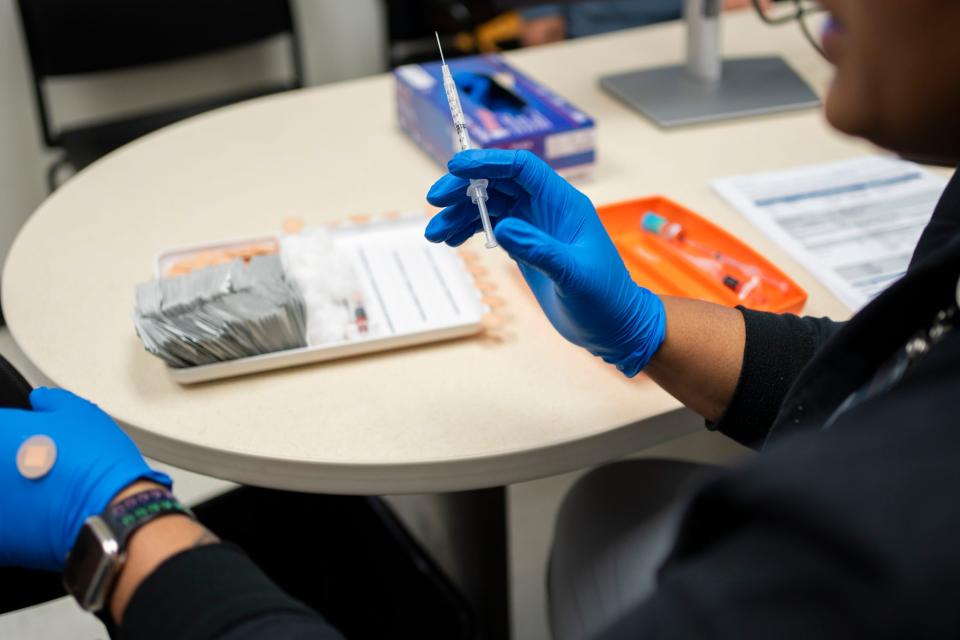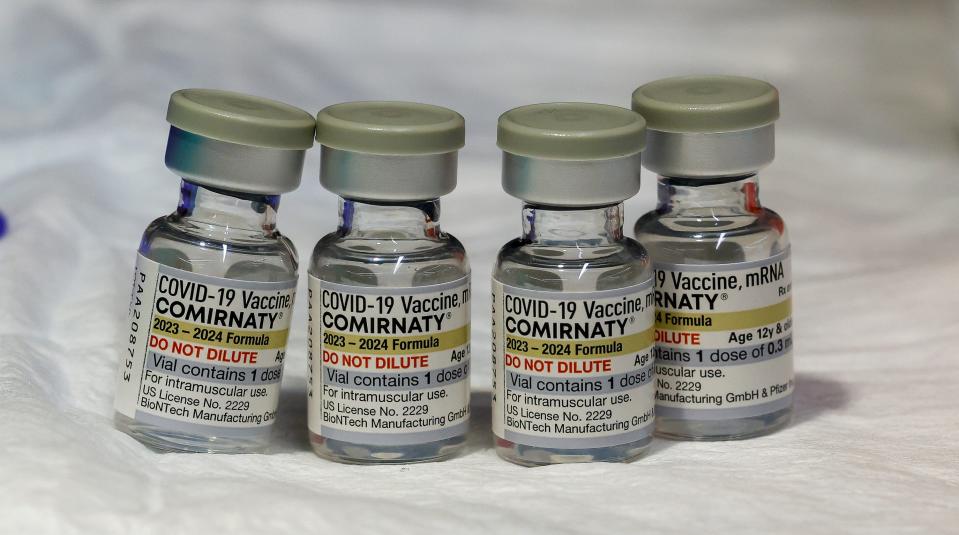Can I get COVID booster, flu shot at the same time? What to know about vaccinations, side-effects
- Oops!Something went wrong.Please try again later.
Fall has arrived, which means many people are starting to think about getting their annual influenza vaccines and COVID-19 boosters.
Maybe you've seen ads about getting up to date on both your shots ahead of flu season — with one campaign featuring Kansas City Chiefs tight end Travis Kelce — and wondered when you should make that appointment. You might even wonder if it's safe to get both the COVID vaccine and flu shot at the same time.
Experts warn that getting properly vaccinated against respiratory viruses ahead of the cold months is critical, especially on the heels of a late-summer uptick in COVID-19 infections.
Here's what to know about this year's vaccines and what experts are recommending.
Flu season: CDC announces flu shot recommendations
When can I get the flu vaccine and COVID booster?

Both shots are now available.
Also available is a vaccine for RSV (respiratory syncytial virus). The world's first RSV vaccine was approved in May by the Food and Drug Administration to protect adults 60 and older from the worst symptoms of the common respiratory virus, which infects the lungs and breathing passages.
It takes about two weeks after getting the shots for our bodies to build enough antibodies to protect us from the viruses. That's why the Centers for Disease Control and Prevention recommends that people start thinking now about getting vaccines before the end of October as cases of respiratory viruses ramp up.
The flu shot is recommended for most adults and children over 6 months old.
During last year's flu season, which typically peaks between December and February, the CDC reported there were up to 54 million flu illnesses and 58,000 flu-related deaths in the United States. Getting a vaccine is vital, experts say, as the CDC also estimates that flu shots prevented another 1.8 million flu-related illnesses during the previous season.
The CDC also recommends that everyone ages 5 years and older get one dose of the new Pfizer-BioNTech or Moderna COVID-19 vaccine at least two months after getting their last dose. For children between 6 months and 4 years old, the CDC says they should get one to two doses of updated COVID-19 vaccine if they haven't received any COVID-19 shots before, or one to two doses if they received COVID-19 vaccines before Sept. 12, 2023.
President Joe Biden: POTUS got a COVID booster and flu shot. White House urges other Americans to do the same
Is it safe to get a flu shot and a COVID-19 booster at the same time? Can you get them in the same arm?
While Americans can schedule their vaccines separately, it is safe to get both the COVID vaccine and flu shot at the same time, according to the CDC.
In fact, the two were often administered simultaneously during the last two flu seasons. The convenience of making only one trip to your nearby pharmacy or primary care physician is met with only the small downside that you may feel temporarily a little worse than you would had you gotten one at a time, according to a CDC study.
Actually, it doesn't even matter if you get them both in the same arm or not.
One recent study published in July on the Jama Network found that getting the COVID vaccine and the flu shot together did not significantly alter the body’s immune response to one or both vaccines.
However, since the RSV vaccine is so new, information on receiving it at the same time as either the flu or COVID-19 vaccines is limited, according to a CDC report that did not make a recommendation either way.

What the data says: Are COVID vaccine concerns impacting flu-shot rates?
How can I expect to feel the next day?
Those who opt for both shots at once only stand to experience slightly more severe reactions, research shows.
Side effects like fatigue, headaches and muscle aches are more likely to occur when both shots are administered together, according to the CDC.
"These reactions were mostly mild and went away quickly," the CDC concluded.
Eric Lagatta covers breaking and trending news for USA TODAY. Reach him at elagatta@gannett.com
This article originally appeared on USA TODAY: Can you get new COVID booster and flu shot together? What to know

